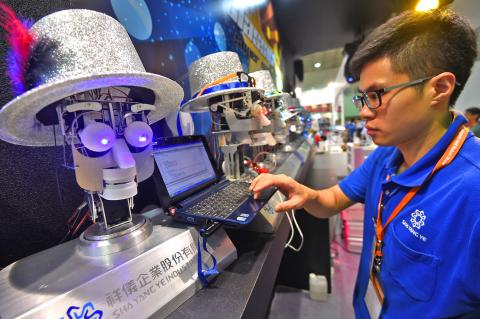The exports of Taiwan’s machine tool industry are expected to drop month-by-month this quarter, affected by falling demand in China and Europe, although the demand for Taiwanese robots is to grow this quarter, a Taiwan Automation Intelligence and Robots Association (台灣智慧自動化與機器人協會) official said yesterday.
“The export value for machine tools plunged 19.4 percent annually to US$284 million last month… We expect the size of the decline to expand further this month due to a lack of demand,” association chairman Eric Chuo (卓永財) told reporters on the sidelines of the opening ceremony of Automation Intelligence and Robots Show at the Taipei World Trade Center Nangang Exhibition Hall.
The order visibility for Taiwan’s machine tools in the final quarter of the year is unclear at the moment, he said.

Photo: Chang Chia-ming, Taipei Times
The sector’s export value dropped 9.1 percent annually to US$164.6 million in the first half of this year, according to data from the Taiwan Machine Tool & Accessory Builders’ Association (臺灣區工具機暨零組件工業同業公會).
By export destinations, Chuo, who is chairman of the nation’s leading machine tool manufacturer — Hiwin Technologies Corp (上銀) — said the demand from Europe and China was weaker than expected, and that only US orders remained robust in the past six months.
Chuo said the weakness of the yen against the US dollar also affected Taiwan’s machine tool industry, as a cheaper Japanese currency undercuts orders to Taiwanese companies, while the strength of the New Taiwan dollar also had a negative impact.
The increasing localization of supply chains and softer-than-expected economic growth in China has also affected local machine tools demand, Chuo said.
Taiwanese machine tool makers need to invest in research and development to raise their competitiveness, such as investing in industrial automation or robots to meet the rising demand in the global market, he said.
Hiwin’s consolidated sales reached NT$7.95 billion (US$253.91 million) in the first half of this year, up 21.53 percent from NT$6.55 billion a year earlier, which Chuo attributed to an increase in sales for its automation and robots segment.
Chuo said he expects the export value for Taiwan’s industrial robots to grow month-by-month this quarter.
Machine and robotic control maker Avantech-LNC Technology Co Ltd (研華寶元) has a similar outlook, saying that it expects the demand for industrial automation to be stronger in the second half of this year due to labor shortages in China.
“Industrial computers that control industrial robots will benefit from the rising demand for industrial automation,” Avantech-LNC sales representative Allen Fan (范聖明) told the Taipei Times.
The Ministry of Economic Affairs said it estimates the production value of Taiwan’s industrial automation, including industrial robots, is likely to increase 10 percent annually this year to NT$1.2 trillion.

MULTIFACETED: A task force has analyzed possible scenarios and created responses to assist domestic industries in dealing with US tariffs, the economics minister said The Executive Yuan is tomorrow to announce countermeasures to US President Donald Trump’s planned reciprocal tariffs, although the details of the plan would not be made public until Monday next week, Minister of Economic Affairs J.W. Kuo (郭智輝) said yesterday. The Cabinet established an economic and trade task force in November last year to deal with US trade and tariff related issues, Kuo told reporters outside the legislature in Taipei. The task force has been analyzing and evaluating all kinds of scenarios to identify suitable responses and determine how best to assist domestic industries in managing the effects of Trump’s tariffs, he

TIGHT-LIPPED: UMC said it had no merger plans at the moment, after Nikkei Asia reported that the firm and GlobalFoundries were considering restarting merger talks United Microelectronics Corp (UMC, 聯電), the world’s No. 4 contract chipmaker, yesterday launched a new US$5 billion 12-inch chip factory in Singapore as part of its latest effort to diversify its manufacturing footprint amid growing geopolitical risks. The new factory, adjacent to UMC’s existing Singapore fab in the Pasir Res Wafer Fab Park, is scheduled to enter volume production next year, utilizing mature 22-nanometer and 28-nanometer process technologies, UMC said in a statement. The company plans to invest US$5 billion during the first phase of the new fab, which would have an installed capacity of 30,000 12-inch wafers per month, it said. The

Taiwan’s official purchasing managers’ index (PMI) last month rose 0.2 percentage points to 54.2, in a second consecutive month of expansion, thanks to front-loading demand intended to avoid potential US tariff hikes, the Chung-Hua Institution for Economic Research (CIER, 中華經濟研究院) said yesterday. While short-term demand appeared robust, uncertainties rose due to US President Donald Trump’s unpredictable trade policy, CIER president Lien Hsien-ming (連賢明) told a news conference in Taipei. Taiwan’s economy this year would be characterized by high-level fluctuations and the volatility would be wilder than most expect, Lien said Demand for electronics, particularly semiconductors, continues to benefit from US technology giants’ effort

‘SWASTICAR’: Tesla CEO Elon Musk’s close association with Donald Trump has prompted opponents to brand him a ‘Nazi’ and resulted in a dramatic drop in sales Demonstrators descended on Tesla Inc dealerships across the US, and in Europe and Canada on Saturday to protest company chief Elon Musk, who has amassed extraordinary power as a top adviser to US President Donald Trump. Waving signs with messages such as “Musk is stealing our money” and “Reclaim our country,” the protests largely took place peacefully following fiery episodes of vandalism on Tesla vehicles, dealerships and other facilities in recent weeks that US officials have denounced as terrorism. Hundreds rallied on Saturday outside the Tesla dealership in Manhattan. Some blasted Musk, the world’s richest man, while others demanded the shuttering of his